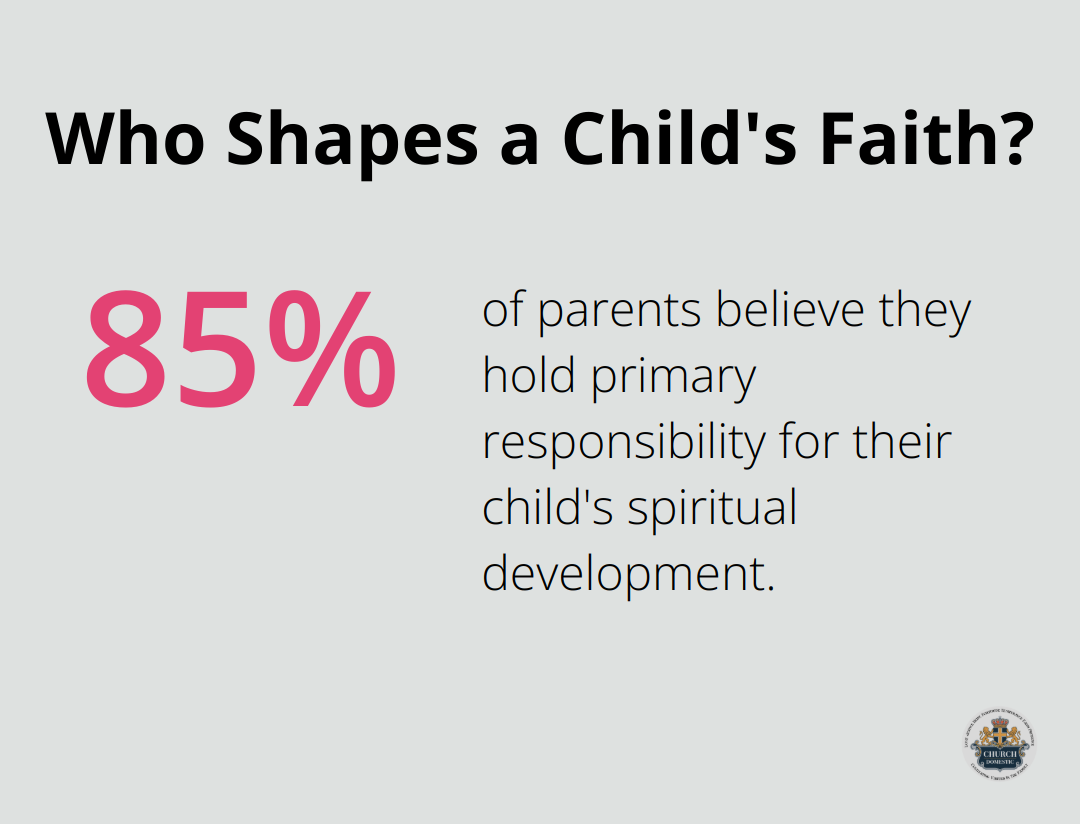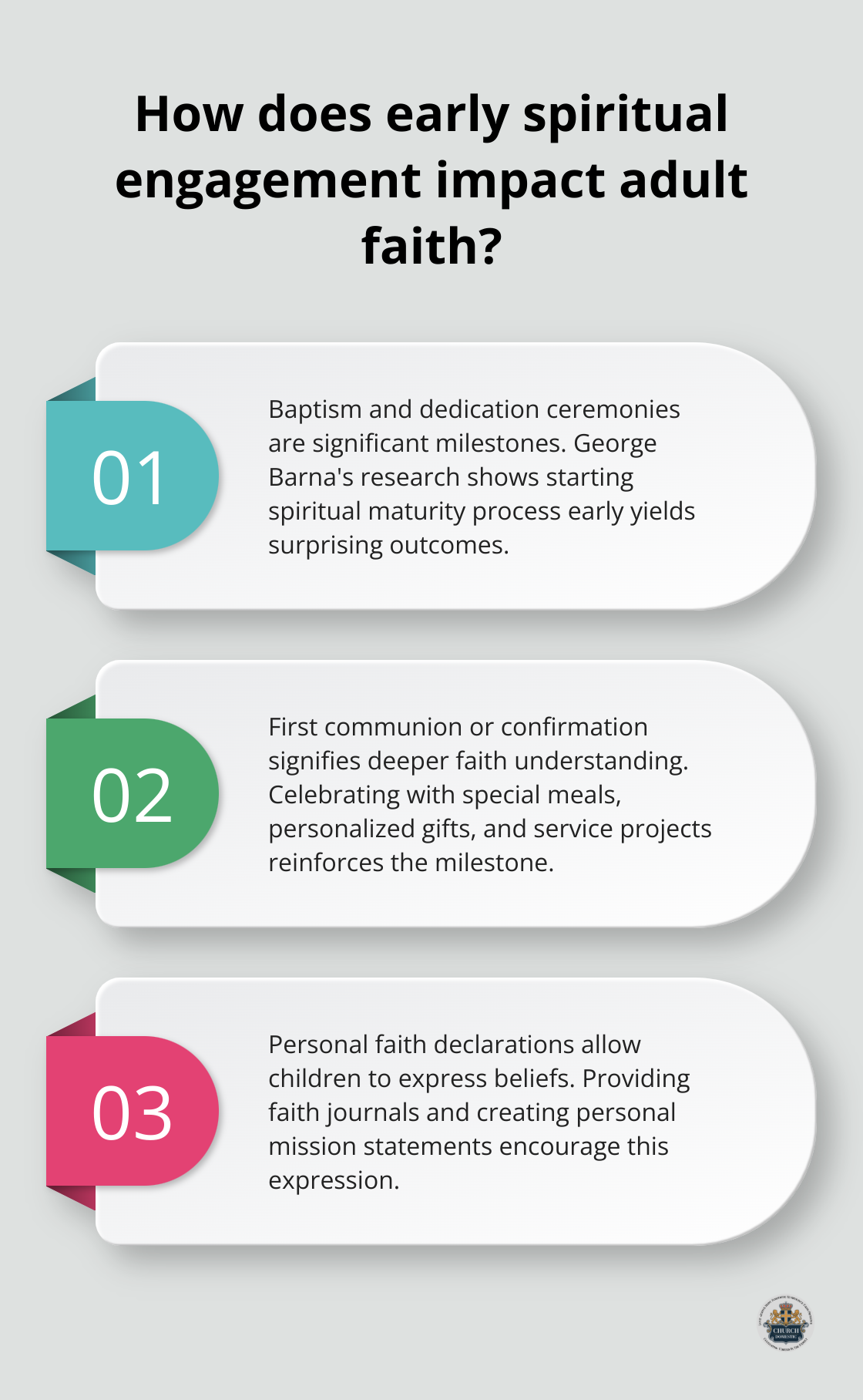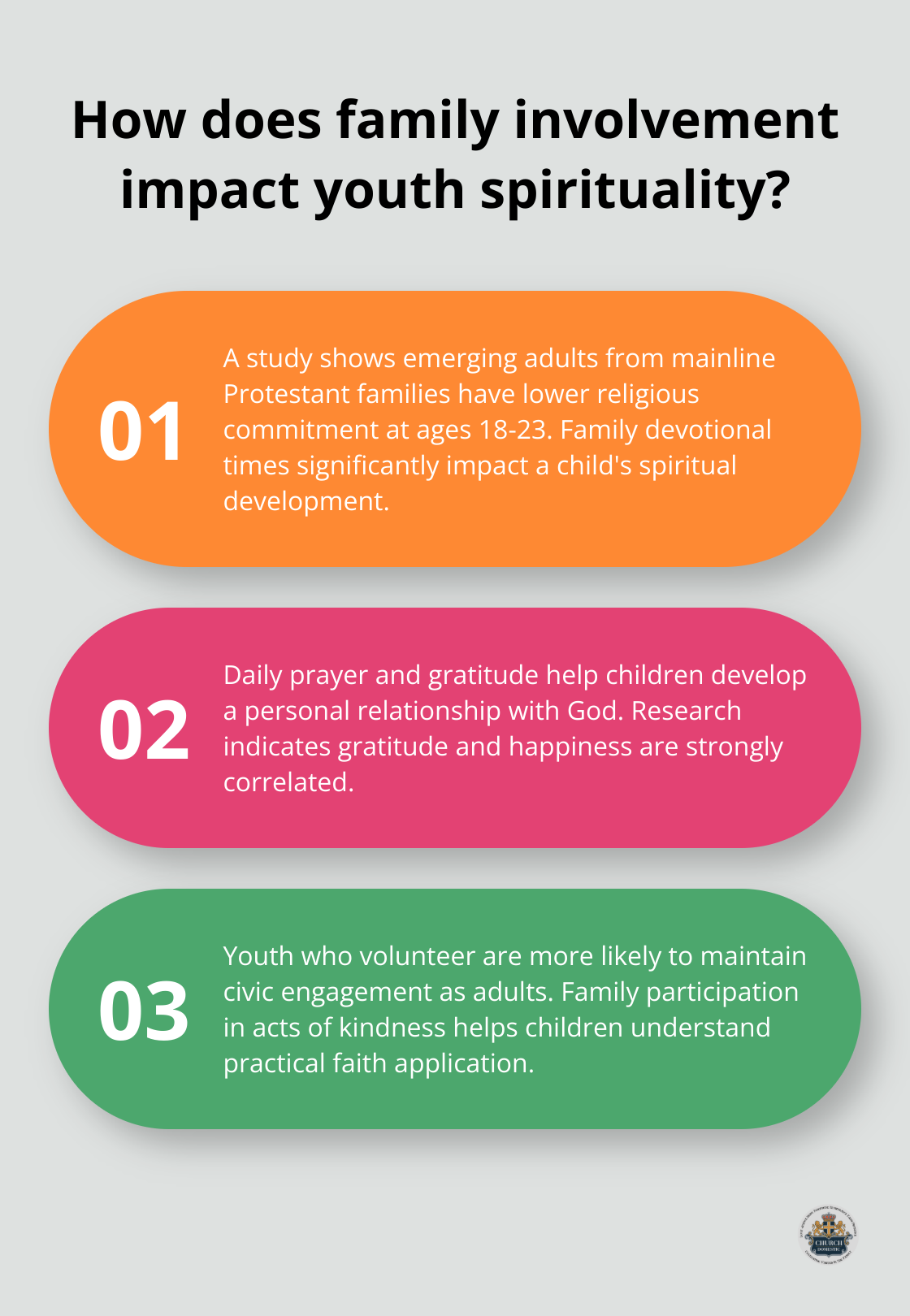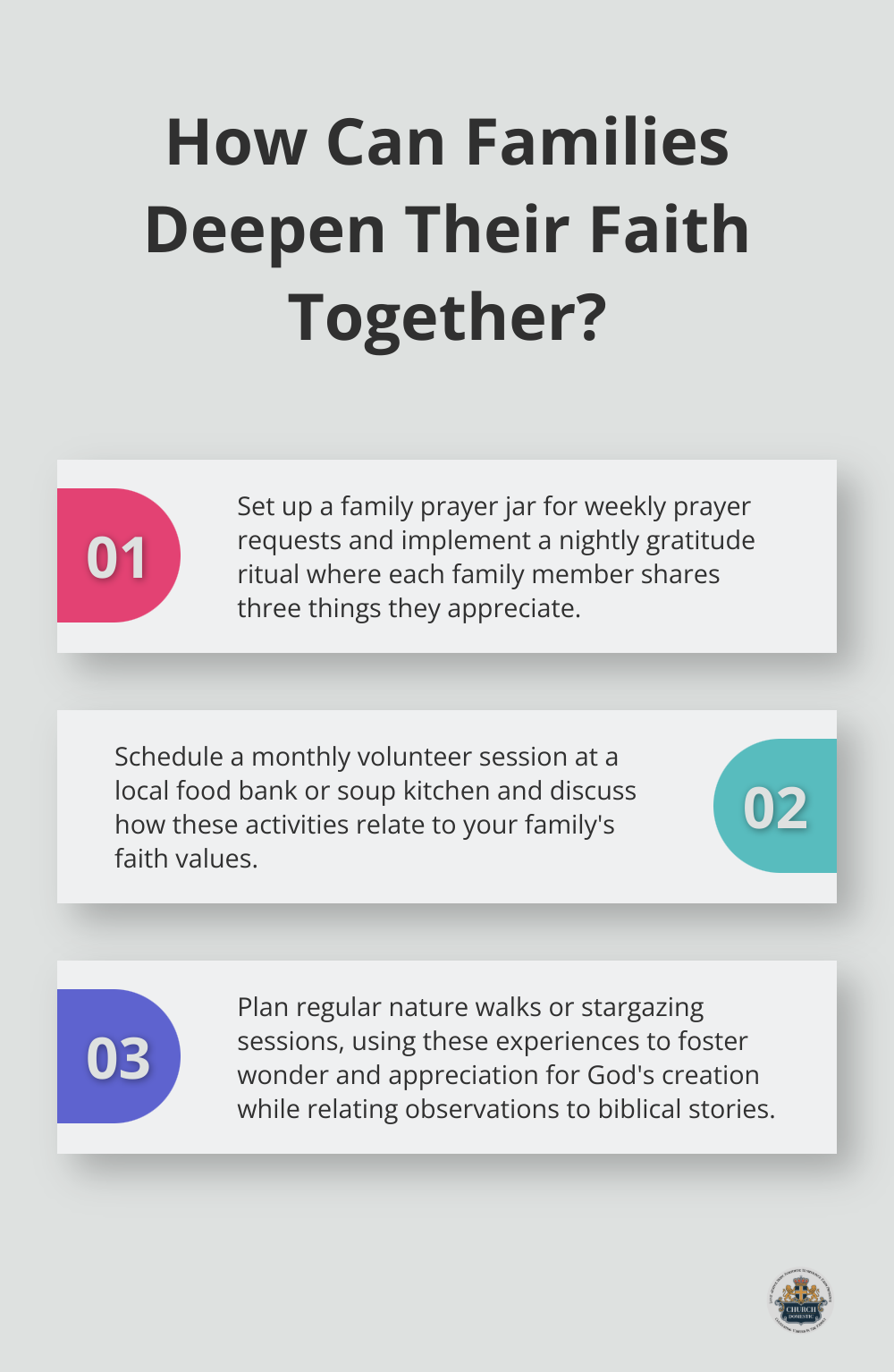At Church Domestic, we understand the importance of nurturing your child’s spiritual journey.
Watching your little ones grow in faith is a beautiful and rewarding experience. This blog post will guide you through celebrating faith milestones and fostering your child’s spiritual development.
Let’s explore practical ways to recognize and honor your child’s spiritual growth, creating lasting memories along the way.
How Does a Child’s Faith Grow?
Understanding Spiritual Curiosity
Children often exhibit signs of spiritual curiosity from a young age. These signs can manifest as questions about God, interest in prayer, or expressions of wonder at nature. Parents should recognize and nurture these early indications of faith development.
Stages of Faith Development
James Fowler, a developmental psychologist, identified seven primary stages of faith development (including Stage 0) in the life of an individual. For children, these typically include:
- Intuitive-Projective Faith (ages 3-7): Children form their first images of God.
- Mythic-Literal Faith (ages 7-12): They understand religious stories and beliefs more literally.

Parents can tailor their approach to their child’s spiritual needs by understanding these stages.
The Home as a Spiritual Nursery
The home environment plays a pivotal role in a child’s spiritual growth. A study by the Barna Group found that 85% of parents believe they hold primary responsibility for their child’s spiritual development. Here are practical ways to foster faith at home:
- Create a faith-friendly environment: Display religious symbols or artwork that spark conversations.
- Establish family rituals: Regular prayer times or Bible readings can anchor faith in daily life.
- Encourage questions: Be open to your child’s spiritual inquiries (even if you don’t have all the answers).
Identifying Spiritual Growth
Spiritual growth doesn’t always follow a linear path or lend itself to easy measurement. However, parents might notice:
- Increased empathy and kindness towards others
- A growing interest in religious texts or stories
- Spontaneous expressions of gratitude or wonder
Each child’s spiritual journey is unique. Parents should provide a supportive, loving environment where faith can flourish naturally.
Celebrating Milestones
Recognizing small moments of growth can encourage further spiritual development. Whether it’s acknowledging a thoughtful prayer or praising an act of kindness, celebrating your child’s spiritual progress can reinforce their faith journey.
As we move forward, let’s explore how to create meaningful celebrations for these spiritual milestones, turning them into cherished memories that will strengthen your child’s faith for years to come.
How to Mark Spiritual Milestones
Celebrating your child’s spiritual journey reinforces their faith and creates lasting memories. Let’s explore how to make these celebrations meaningful and impactful.
Baptism and Dedication Ceremonies
Baptism and dedication ceremonies represent significant milestones in a child’s spiritual journey. According to research by George Barna, starting the spiritual maturity process at a young age yields surprising outcomes. To personalize these events:
- Ask older siblings or close family friends to participate in the ceremony.
- Design a special keepsake (such as a photo album or video montage) to document the day.
- Organize a post-ceremony gathering where loved ones share blessings or words of encouragement.
First Communion or Confirmation
For many denominations, first communion or confirmation signifies a child’s deeper understanding of their faith. To celebrate this milestone:
- Plan a special family meal featuring the child’s favorite foods.
- Present a personalized Bible or devotional book as a gift.
- Arrange a service project that aligns with your child’s interests, putting their faith into action.
Personal Faith Declarations
As children mature, they often want to express their faith in their own words. Encourage this by:
- Providing a faith journal for writing prayers, reflections, or questions.
- Scheduling a special time for them to share their thoughts on faith with the family.
- Assisting them in creating a personal mission statement or faith goals for the year ahead.
A LifeWay Research study found that parents’ spiritual practices with their children as kids significantly impact their engagement as adults, emphasizing the importance of early spiritual foundations.
Customizing Celebrations
These celebrations should reflect your child’s personality and your family’s traditions. The goal is to create meaningful experiences that strengthen your child’s spiritual growth and foster a lifelong connection to faith.
Transitioning to Daily Practices
While milestone celebrations mark significant moments, daily practices play an equally important role in nurturing spiritual growth. In the next section, we’ll explore how to incorporate these practices into your family’s routine, creating a consistent environment for spiritual development.

Daily Habits for Spiritual Growth
Family Devotional Times
Regular family devotional times significantly impact a child’s spiritual development. However, a study reveals that emerging adults raised in mainline Protestant families have a statistically significant lower probability of being religiously committed or active at ages 18-23 than those who were not raised in such environments as teenagers.

To create engaging family devotionals:
- Select a consistent time that accommodates everyone’s schedule (e.g., after dinner or before bedtime).
- Use age-appropriate devotional materials or Bible stories.
- Invite each family member to share their thoughts and questions.
- Keep sessions brief (10-15 minutes) to maintain interest, especially for younger children.
Prayer and Gratitude Practices
Daily prayer and gratitude help children develop a personal relationship with God. Research in Positive Psychology has found that gratitude and happiness are always strongly correlated.
Try these practical ideas:
- Create a family prayer jar for weekly prayer requests.
- Implement a nightly gratitude ritual (each person names three things they appreciate).
- Provide prayer journals for older children to record their thoughts and prayers.
Acts of Kindness and Service
Family participation in acts of kindness and service projects helps children understand the practical application of their faith. Research from the Corporation for National and Community Service indicates that youth who volunteer are more likely to maintain civic engagement as adults.
Consider these family-friendly service ideas:
- Volunteer at a local food bank or soup kitchen monthly.
- Organize a neighborhood clean-up day.
- Prepare care packages for homeless shelters or nursing homes.
Discuss how these activities relate to your family’s faith values, helping children connect their actions to their beliefs.
Spiritual Conversations
Encourage open discussions about faith and spirituality in your home. Create a safe space where children feel comfortable asking questions and expressing doubts. These conversations can occur during car rides, meal times, or before bed.
Try to:
- Listen actively without judgment.
- Share your own faith experiences and challenges.
- Use current events or media as conversation starters about faith and values.
Nature Exploration
Connecting with nature can foster a sense of wonder and appreciation for God’s creation. Plan regular outdoor activities that allow your family to experience the beauty of the natural world.
Ideas include:
- Taking nature walks and discussing the intricacies of plants and animals.
- Stargazing and learning about constellations (relating them to biblical stories if applicable).
- Planting a garden and nurturing it together (discussing growth, patience, and care).
These daily practices create a strong foundation for a lifelong journey of faith, compassion, and service.
Final Thoughts
Celebrating your child’s faith milestones creates lasting memories that reinforce the importance of spiritual development. These celebrations, whether grand or simple, serve as touchstones in their spiritual journey. Parents play a vital role in nurturing their children’s faith beyond these milestone moments through daily practices, conversations, and personal examples.

Each child’s spiritual journey unfolds uniquely, and it’s essential to provide a supportive environment where questions and exploration thrive. Embracing faith as a family strengthens individual relationships with God and family bonds. This shared experience creates a common language of faith and a united purpose to guide your family through life’s challenges and joys.
The values, beliefs, and practices you instill now will shape your child’s character and worldview throughout their lives. For more resources on nurturing your family’s spiritual life and celebrating faith milestones, visit us at Church Domestic. We support you in raising spiritually grounded children and building a faith-filled home.